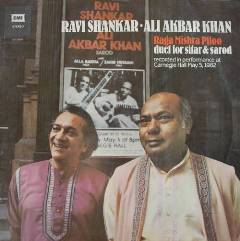Ravi Shankar & Ali Akbar Khan - Raga Mishra Piloo (1984)
Ravi Shankar & Ali Akbar Khan - Raga Mishra Piloo (1984)

1. Raga Mishra – Piloo Beginning 2. Raga Mishra – Piloo Conclusion Ravi Shankar – sitar Ali Akbar Khan - sarod. (Carnegie Hall, May 5, 1982)
From his small, low platform covered with Indian rugs, Ravi Shankar has brought the music of India to audiences around the world. He has introduced the sitar—a long-necked Indian Lute—to such new domains as film, ballet, and orchestra. A complete musician, he is renowned equally as a concert soloist, composer, and conductor. He is also one of the few composers to have been greatly appreciated and embraced by such diverse audiences as the classical, jazz, pop, ethnic, and New Age music circles. It seems inevitable that his greatest wish will come true: above all things to be remembered for his musical creations.
Shankar was born Robindro Shankar on April 7, 1920, in Benares, which is considered the holiest of cities in India. He was the youngest son of a family of Bengali Brahmins, coming from an upper-class background. When he was ten years old Ravi was sent to Paris where his eldest brother, the great dancer Uday Shankar, had a troupe of gifted Indian dancers and musicians. Ravi became quite successful and was soon billed as a star dancer in their tours of Europe and the United States. He also attended school in Paris where he met many great musicians who exposed him to Western music.
In 1935 Uday invited sarod master Ustad Allauddin Khan to join the company and play as the principle soloist. Ravi was deeply impressed by his playing and spent most of the following year acting as Allauddin Khan’s interpreter and guide in the hope of becoming his pupil. Before his departure Khan agreed to teach Ravi to play the sitar only if he gave up the fame and fortune of the artist’s life in Paris and came to study with him in Maihar, a small village in India.
After a year of soul-searching Ravi decided to go to Maihar and submerge himself in intensive study and total dedication to his guru, Allauddin Khan. He shaved his head, wore clothes of coarse material, and slept only four or five hours a night with a one-hour nap in the afternoon. Ravi would then practice for 12 hours a day, sometimes until his fingers bled. The rest of the time was devoted to study, prayer, and meditation with the guru. “When music is not written down and you learn by an oral tradition,” Shankar was quoted as saying in the Washington Post, “what is transmitted by the guru is not merely a technique but a feeling. My guru taught me that the best way to worship is by music.”
After seven and a half years of study, Ravi became a virtuoso and began playing concerts throughout India. He married his guru’s daughter, Annapurna, once he had established himself as a success. He then founded the Vadya Vrinda, the Indian National Orchestra at All-India Radio. For the next seven years, Shankar conducted most of the concerts and wrote some 200 compositions. --- encyclopedia.com/topic/Ravi_Shankar.aspx
download: uploaded anonfiles mega 4shared mixturecloud yandex mediafire ziddu
Zmieniony (Wtorek, 06 Sierpień 2013 17:09)








